New partnership announced with Borderless
Sona and Borderless announce an exciting partnership.
Building a staff schedule couldn’t be easier.
Reduce payroll errors with real-time T&A.
Fill 50% more shifts with your own employees.
Ensure shifts are covered even if you're understaffed.
Manage absence requests and approvals.
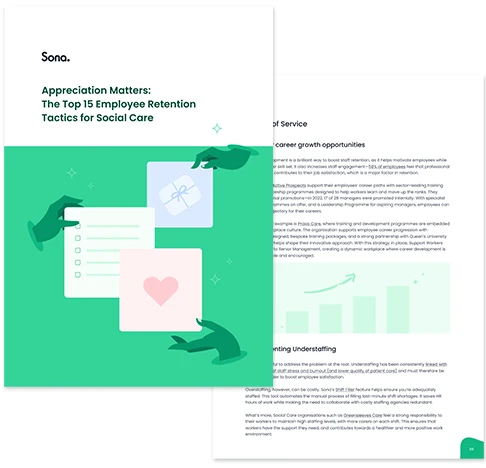
Practical ways to boost team morale with proven examples from across the sector.
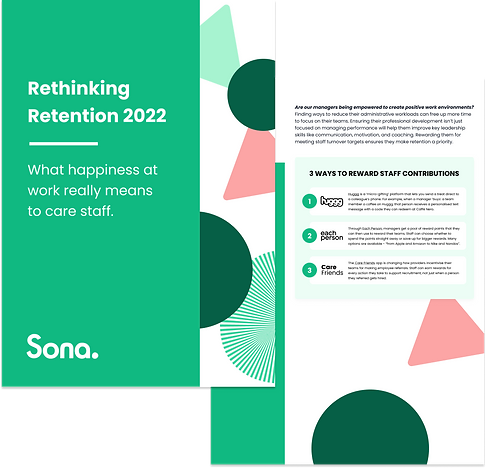
Find out what care employees say matters to them most at work.
Search and view employees with customised permission levels.
Key employment information all in one place.
Store visas, professional certifications and more with easy access.
Control personal and operational details of your staff.
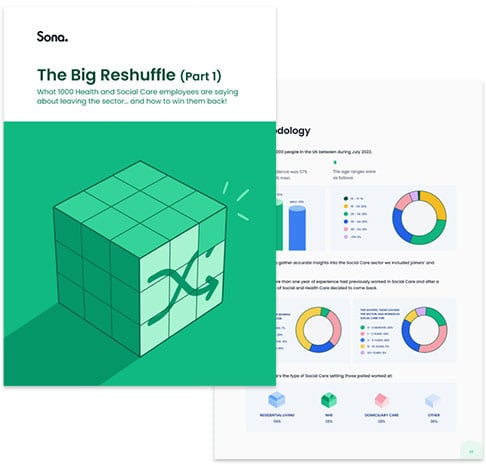
Why are people leaving Social Care, and where are they going?
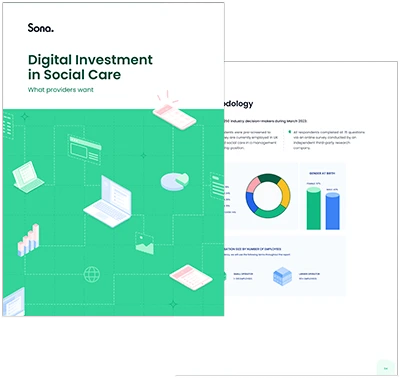
We asked 250 Social Care leaders about their attitudes towards digitisation and their plans for the next 12 months...
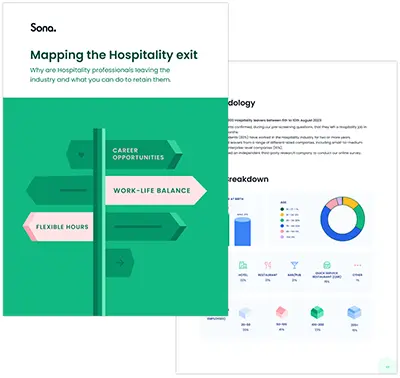
Why are Hospitality workers leaving the industry, and what can you do to retain them?
Share updates with a single click.

Staff can see relevant messages in one place.
Request post-shift feedback from staff.
Recognise staff contributions by sending them praise.
Identify staff at risk of churning.
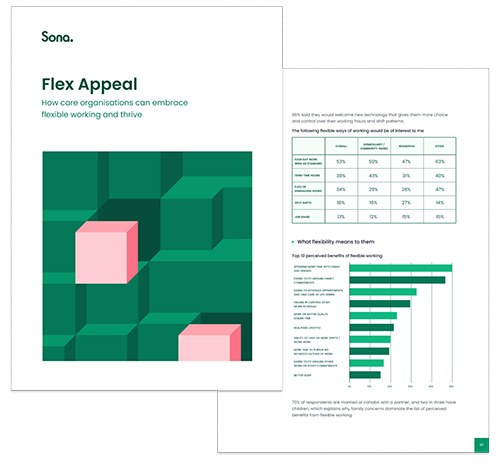
How care organisations can embrace flexible working and thrive.
Maintain quality of care and reduce costs.
Maximise profitability through AI-powered forecasting & scheduling.
Elevate your operational efficiency and guest satisfaction.
Streamline operations across sites.
Developed alongside Social Care experts with decades of combined experience.
See why we are the leading user-friendly, end-to-end platform that prioritises both efficiency and wellbeing.
The Sona Partner Network is an ecosystem of solution experts and complementary technologies.

Give staff greater visibility of shifts available to work, with a simple "shift claim" process to increase their income.
Improve employee engagement and retention with a seamless employee communication platform.
Happier staff provide greater customer experiences, which in turn drives return rates, revenues and recommendations.
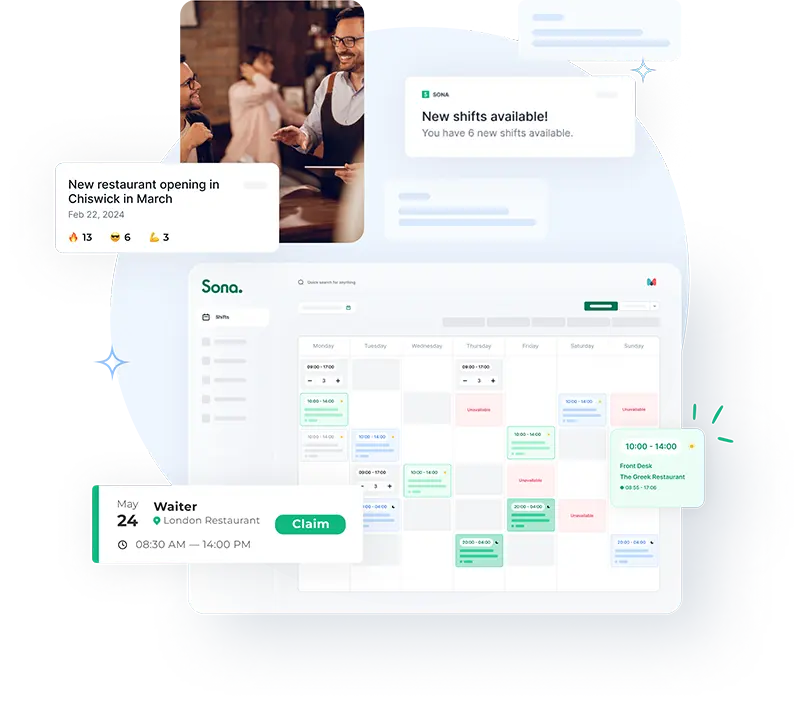
Give staff greater visibility of shifts available to work, with a simple "shift claim" process to increase their income.
Improve employee engagement and retention with a seamless employee communication platform.
Happier staff provide greater customer experiences, which in turn drives return rates, revenues and recommendations.
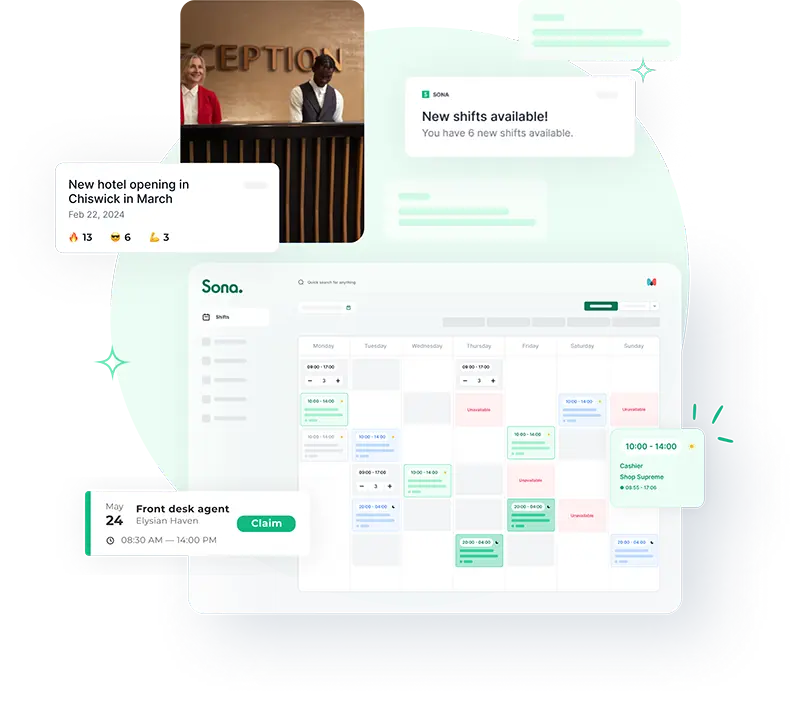
Meet the Sona team online with our webinar series or in-person at an event near you.
New research, insights, and strategies for frontline leaders.
Downloadable templates, reports and guides from Sona.
Stay up to date with the latest Sona news and research.
Learn how our customers are transforming their people operations.
| 3 min read
Sona and Borderless announce an exciting partnership.
| 2 min read
Sona and Found by Lottie announce an exciting partnership.
| 4 min read
Remove operational errors, drive efficiency, and help your team spend less time on admin with a unified solution.
PUBLISHED: February 2025
Download the report to learn how hospitality operators are embracing AI challenges and opportunities in 2025.
PUBLISHED: January 2025
Reveal the most important metrics in 2025!
PUBLISHED: December 2024
This infosheet is packed with practical insights to drive high-quality, low-regret WFM purchases.HR and recruitment teams in Social Care will face many challenges in a year expected to be defined by inflation and its impact on the cost of living. Here are the five biggest challenges–and how to address them.
10 minute read
Last year, many of us expected the formal end of the pandemic to provide a springboard for business. Almost one month into 2023, the reality is very different. Inflation, war, and the pandemic aftermath have created new kinds of uncertainty, and the Social Care workforce will certainly be impacted.
The combined effects of Brexit and COVID-19 have further weakened the already fragile labour market in the Social Care sector. The current employment gap stands at 10% and is projected to account for an estimated one million workers by 2037.
The Social Care sector has also been impacted by all-time high inflation (ending 2022 at 10.7%), serious political turmoil (rapidly changing occupants of Number 10), and the devastating Russia-Ukraine War which, quite apart from its human life cost, has triggered a massive increase in food and energy prices across Europe. Then there has been the disruption caused by wave after wave of industrial action.
< Find out what Social Care can expect from Rishi Sunak >
Recruiting, retaining and motivating frontline staff against this backdrop of economic uncertainty and financial concern means there’s a lot on HR leaders’ plates. So let’s dive into the various HR challenges that the Social Care sector will be facing in 2023.
The 30-year-high inflation seen in 2022 seems to be slowing down, but not enough. Workers will still need to stretch their income further to be able to manage their household budgets.
Meanwhile, the climbing energy and food prices triggered by the Russia-Ukraine War are showing no signs of slowing down, and the overall cost of living is soaring – groceries have increased 14.6% and transportation costs have gone up 10.9%.
According to the latest National Care Association (NCA) survey, 89% of respondents said they have been affected by the cost-of-living crisis.
The last thing providers can afford is otherwise happy team members leaving due to financial pressures. HR teams will need to assume the role of financial well-being champions within their organisations in order to prevent this.
Here are a few ways HR teams can financially support their employees:
Set up feedback forms so employees can express which benefits they would appreciate having. This way, they feel heard, and you can ensure you have the right support in place.
 2) Supporting mental health
2) Supporting mental healthCampaign Collective’s recent research revealed some worrying statistics for UK Social Care employers:
With the NCA survey finding that over 40% of respondents believe one of the main focuses of Social Care reform should be workforce training and well-being support, there’s no doubt HR teams must prioritise their employees’ mental health.
Here are some ways in which HR managers and their teams can support their employees’ mental health at work:
By better supporting the mental health of Social Care workers, HR teams are also helping maintain, and even improve, the quality of care given to patients and residents. After all, you can’t pour from an empty cup.
Officially, quiet quitting is “when one does not literally quit one’s job, but rather simply does the work that is expected of the position, without going above and beyond what is expected.”
Quiet quitting is more than just a TikTok trend. As of September 2022, only 8% of workers said they were engaged with work in 2022.
In Social Care, this trend could have a significant and very worrying effect on the quality of care – as well as being costly for the business.
How can HR teams implement measures to avoid the effects of quiet quitting? Three words: recognise, train, and develop.
Nowadays, employee recognition and career development programs are no longer a ‘nice-to-have’; they are a must.
In our Appreciation Matters report, we found that:
HR teams that want to deter quiet quitting can:
 4) Recruiting and retaining the right talent and skills
4) Recruiting and retaining the right talent and skillsThe Social Care workforce is shrinking for the first time in 10 years. In 2022, there were 165,000 vacant posts, 52% higher than the years before.
Finding diverse, high-skilled talent is hard enough, but Brexit and COVID-19 have made recruiting–and retaining–the right talent in the Social Care sector even more complicated.
However, there’s hope. 79% of leavers are open to working in Social Care again in the future. In order to attract them back, employers need to ensure they’re listening to workforce demands, identifying pain points and making real changes.
Here’s how HR teams can improve recruiting and retention amid the Great Resignation:
“Consider opportunities to strengthen the skills and employment agenda within countries. This may include re-skilling workers from declining sectors and industries of the economy (e.g. manufacturing, agriculture) to be redeployed in the health and social care sectors, particularly in jobs and roles where the duration of training is short, and entry barriers are relatively low, without compromising the quality of education and care.”
To solve the workforce shortage in Social Care, widening the talent pool is a must. Talent is everywhere - it just needs to be discovered.
Improving and portraying a realistic perception of Social Care: people don’t only leave their jobs due to financial needs – after all, they know what the salary will be from the start. But some may leave if they find the work significantly more demanding than expected. By setting up the right expectations (and implementing strategies to ensure employee well-being), workers will stay longer in their jobs.
Additionally, the false perception of Social Care work being low-paid, low-skilled and involving long, demanding hours and little recognition needs to change in order to attract more people.
Outreach programs, working with the media, and participating in various events can help improve the image of the sector.
Two-way dialogue to help retain staff: by performing exit interviews with those that choose to leave and constantly having feedback and dialogues with employees can help you understand what you need to do to retain your care staff.
Last but not least, HR teams can help their employees thrive by reducing unnecessary paperwork and admin that staff and managers have to go through as part of their current workloads.
Using technology, new, sensible policies, and offering flexible working arrangements can help employees feel like their time is spent where it needs to be: in providing great quality care.
Using solutions like Sona’s Frontline Operating System, you can reduce managers' workload by as much as 5 hours per week, help workers quickly pick up available shifts with just a few clicks, and send feedback forms within seconds through the app.
Start 2023 with your best foot forward by following these tips on how to address each of the five biggest HR challenges the Social Care sector faces. See how Sona can help you make the most of your workforce today – book a time to speak with us.
If you liked this article, why not subscribe to our newsletter to get the latest news and views delivered straight to your inbox?
4 min read
Here are five challenges that will be occupying the minds of HR and recruitment teams in the new post-Brexit, post-lockdown world.
3 min read
The care sector is facing a serious workforce crisis. Employee recognition programmes offer a simple solution to the challenge of high staff turnover.
13 min read
Sona’s digital transformation webinar addressed challenges and solutions for achieving a bright future in Social Care. Check the main takeaways here.